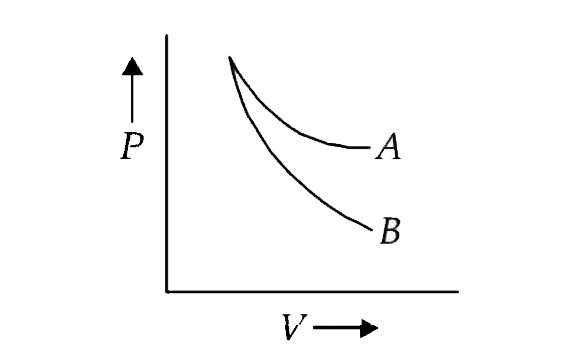Isothermal and adiabatic process are identical.
To determine whether the statement "Isothermal and adiabatic processes are identical" is true or false, we can analyze the characteristics of both processes step by step.
1. Definition of Isothermal Process:
- An isothermal process is defined as a thermodynamic process in which the temperature of the system remains constant throughout the process. This means that any heat added to the system is used to do work, and the internal energy of the system does not change.
- Mathematically, we can express this as:
ΔT=0(Temperature change is zero)
2. Definition of Adiabatic Process:
- An adiabatic process is defined as a thermodynamic process in which no heat is exchanged with the surroundings. This means that all the work done on or by the system results in a change in internal energy.
- Mathematically, we can express this as:
ΔQ=0(Heat transfer is zero)
3. Comparison of Processes:
- In an isothermal process, since the temperature is constant, the internal energy change (ΔU) is zero for an ideal gas. The heat added to the system is equal to the work done by the system:
ΔQ=W
- In an adiabatic process, since there is no heat exchange, the work done results in a change in internal energy:
ΔQ=0⟹ΔU=−W
4. Speed of Processes:
- Isothermal processes are generally slower because they require time for heat exchange to maintain constant temperature.
- Adiabatic processes are typically faster because they occur without heat exchange, leading to rapid changes in temperature and pressure.
5. Conclusion:
- Since the fundamental characteristics of isothermal and adiabatic processes are different (constant temperature vs. no heat exchange), we conclude that the statement "Isothermal and adiabatic processes are identical" is false.
Final Answer:
The statement is false; isothermal and adiabatic processes are not identical.
- An isothermal process is defined as a thermodynamic process in which the temperature of the system remains constant throughout the process. This means that any heat added to the system is used to do work, and the internal energy of the system does not change.
- Mathematically, we can express this as:
ΔT=0(Temperature change is zero)
- An adiabatic process is defined as a thermodynamic process in which no heat is exchanged with the surroundings. This means that all the work done on or by the system results in a change in internal energy.
- Mathematically, we can express this as:
ΔQ=0(Heat transfer is zero)
- In an isothermal process, since the temperature is constant, the internal energy change (ΔU) is zero for an ideal gas. The heat added to the system is equal to the work done by the system:
ΔQ=W
- In an adiabatic process, since there is no heat exchange, the work done results in a change in internal energy:
ΔQ=0⟹ΔU=−W
- Isothermal processes are generally slower because they require time for heat exchange to maintain constant temperature.
- Adiabatic processes are typically faster because they occur without heat exchange, leading to rapid changes in temperature and pressure.
- Since the fundamental characteristics of isothermal and adiabatic processes are different (constant temperature vs. no heat exchange), we conclude that the statement "Isothermal and adiabatic processes are identical" is false.
The statement is false; isothermal and adiabatic processes are not identical.
Similar Questions
In adiabatic process
View SolutionIn an adiabatic process
View SolutionIn an adiabatic process-
View SolutionIn a adiabatic process.
View SolutionFor an adiabatic process :
View SolutionThe curves A and B in the figure shown P-V graphs for an isothermal and an adiabatic process for an idea gas. The isothermal process is represented by the curve A.

View SolutionThe curves A and B in the figure shown P-V graphs for an isothermal and an adiabatic process for an idea gas. The isothermal process is represented by the curve A.

View SolutionWrite first law of thermodynamic system and explain isochoric, isothermal and adiabatic process on its basis.
View SolutionAn adiabatic process occurs in
View SolutionAssertion: Isothermal and adiabatic, two processes are shown on p-V diagram. Process-1 is aidabatic and process-2 is isothermal.
Reason: At a given point, slope of adiabatic process =γ×slope of isothermal process.

View Solution
